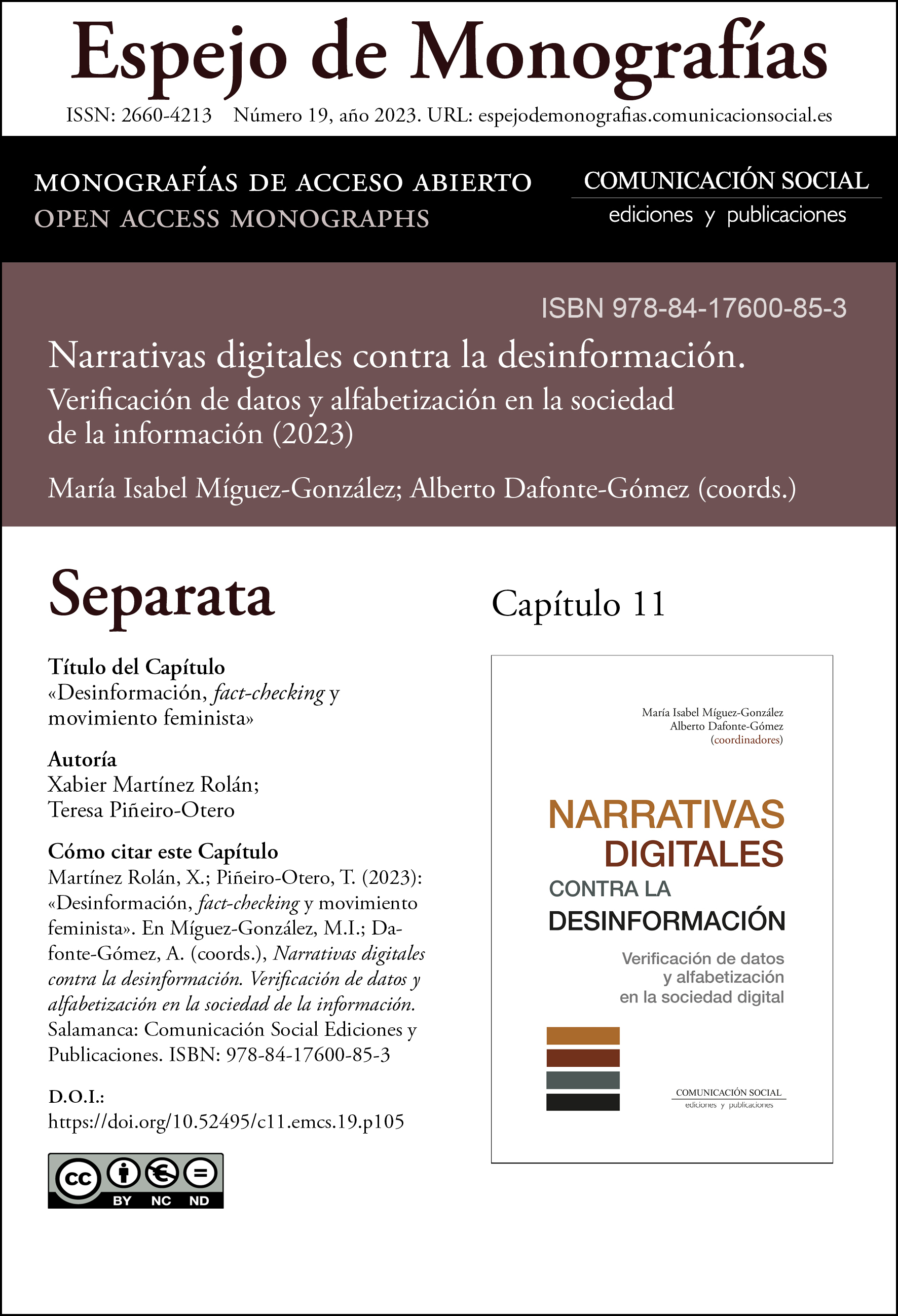Capítulo 11. Desinformación, fact-checking y movimiento feminista
DOI:
https://doi.org/10.52495/c11.emcs.19.p105Palabras clave:
Conectividad e interacciones mediadas, desinformación, fact-checking, feminismo, impacto social de la desinformaciónResumen
El texto analiza como el movimiento feminista se ve afectado negativamente por las noticias falsas, motivo por el que el fact-checking resulta tan necesario.
A lo largo de las diferentes oleadas feministas, los contramovimientos ejercidos han buscado el retroceso de los avances del movimiento y mantener el statu quo de desigualdad e injusticia de género. En el momento actual, el feminismo digital sufre diferentes formas de violencia online contra las mujeres como la machosfera y el troleo de género, que se sirven de noticias falsas y ataques coordinados buscan desacreditar el feminismo y silenciar a las mujeres en Internet.
Ante esto, el fact-checking juega un papel crucial para contrarrestar la desinformación, visibilizar la violencia machista en la red y continuar la lucha en pro de la igualdad.
Descargas
Citas
Bertomeu-Martínez, Angustias (2019): «De la tradición al activismo en redes sociales», Revista tiempo de paz, núm. 134, pp. 77-84.
Bonet-Martí, Jordi (2021): «Los antifeminismos como contramovimiento: una revisión bibliográfica de las principales perspectivas teóricas y de los debates actuales», Teknokultura. Revista de Cultura Digital y Movimientos Sociales, vol. 18, núm. 1, pp. 61-71.
Corbu, Nicoleta; Bârgăoanu, Alina, Durach, Flavia; Udrea, Georgiana (2021): «Fake News Going Viral: The Mediating Effect of Negative Emotions», Media Literacy and Academic Research, vol. 4, núm. 2, pp. 58-87.
Dixon, Kitsy (2014): «Feminist online identity: analyzing the presence of hashtag feminism», Journal of arts and humanities, vol. 3, núm 7, pp. 34-40.
Evans, Sara M. (2002): «Re-Viewing the Second Wave», Feminist Studies, vol. 28, núm. 2, pp. 259-267.
Faludi, Susan (2006): Backlash: The Undeclared War Against American Women, Ed. Crown.
Garrido-Rodríguez, Carmen (2021): «Repensando las olas del Feminismo. Una aproximación teórica a la metáfora de las «olas» », Revista de Investigaciones Feministas, vol. 12, núm. 2, pp. 483-492.
Han, X. (2018): «Searching for an online space for feminism? The Chinese feminist group Gender Watch Women’s Voice and its changing approaches to online misogyny». Feminist Media Studies, vol. 18, núm. 4, pp. 734-749.
Herrero Diz, Paula; Pérez Escolar, Marta; Plaza Sánchez, Juan Francisco (2020): «Desinformación de género: Análisis de los bulos de Maldito Feminismo», Icono14, vol. 18, núm. 2, pp. 188-216.
Herring, Susan; Job-Sluder, Kirk; Scheckler, Rebecca; Barab, Sasha (2002): «Searching for Safety Online: Managing «Trolling» in a Feminist Forum», The Information Society, vol. 18, núm. 5, pp. 371-384.
Labio-Bernal, Aurora; Manzano Zambruno, Laura (2023): «8M Demonstrations, the Spanish Far Right and the Pandemic in a Hybrid Media System», Media and Communication, vol. 11, núm.1, pp. 114-124.
Lamoureux, Diane; Dupuis-Déri, Francis (2015): Les Antiféminismes. Analyse d’un discours réactionnaire, Montréal: Les éditions du remue-ménage.
Lewis, Ruth; Rowe, Michael; Wiper, Clare (2017): «Online Abuse of Feminists as An Emerging form of Violence Against Women and Girls», The British Journal of Criminology, vol. 57, núm. 6, pp. 1462-1481.
Mantilla, Karla (2013): «Gendertrolling: Misogyny adapts to new media». Feminist studies», vol. 39, núm. 2, pp. 563-570.
Murphy, Gillian; Murray, Emma; Gough, Doireann (2021): «Attitudes towards feminism predict susceptibility to feminism-related fake news», Applied Cognitive Psychology, vol. 35, núm. 5, pp. 1182-1192.
Nagle, Angela (2015, November 1). An investigation into contemporary online anti-feminist movements. PhD Thesis. Dublin City University
OMS & OPS (2020): «Entender la infodemia y la desinformación en la lucha contra la COVID-19» https://iris.paho.org/bitstream/handle/10665.2/52053/Factsheet-Infodemic_spa.pdf
Ortega López, María Teresa (2021): «Olas de antifeminismo en España en la Segunda República, la Guerra Civil y la dictadura de Franco», ARENAL, vol. 29, núm 1 (enero-junio), pp. 217-237.
Piñeiro-Otero, Teresa; Martínez-Rolán, Xabier (2021): «Eso no me lo dices en la calle. Análisis del discurso del odio contra las mujeres en Twitter», Profesional de la Información, vol. 30, núm. 5.
Richardson‐Self, L. (2018): «Woman‐Hating: On Misogyny, Sexism, and Hate Speech», Hypatia, vol. 33, núm. 2, pp. 256-272.
Rosińska, Klaudia A. (2021): «Disinformation in Poland: Thematic classification based on content analysis of fake news from 2019», Cyberpsychology: Journal of Psychosocial Research on Cyberspace, vol. 15, núm. 4.
Stabile, Bonnie; Grant, Aubrey; Purohit, Hemant; Harris, Kelsey (2019): «Sex, lies, and stereotypes: Gendered implications of fake news for women in politics», Public Integrity, vol. 21, núm. 5, pp. 491-502.
Tarrow, Sidney G. (2012): «El poder en movimiento. Los movimientos sociales, la acción colectiva y la política», Madrid: Alianza Editorial.
Törnberg, Petter (2018): «Echo chambers and viral misinformation: Modeling fake news as complex contagion», PLoS one, vol. 13, núm. 9, p. e0203958.
Vogels, Emily A. (2021): «The state of online harassment», Pew Research Center. https://www.pewresearch.org/internet/2021/01/13/the-state-of-online-harassment/
Wang, Ming-Te.; Degol, Jessica (2017): «Gender Gap in Science, Technology, Engineering, and Mathematics (STEM): Current Knowledge, Implications for Practice, Policy, and Future Directions», Educational psychology review, vol. 29, núm. 1, pp. 119-140.

Publicado
Cómo citar
Número
Sección
Licencia

Esta obra está bajo una licencia internacional Creative Commons Atribución-NoComercial 4.0.
Los artículos publicados en la revista se distribuyen con la Licencia Creative Commons Atribución-NoComercial-SinDerivadas 4.0 Internacional










